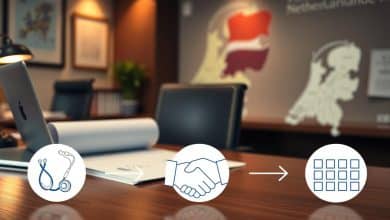Unlock New Opportunities in Amsterdam, Netherlands: Nursing Visa Sponsorship Benefits and How to Apply
Anúncios
The Netherlands faces a critical need for skilled medical staff, with projections showing 40,000+ unfilled positions by 2025.
This shortage creates unique prospects for qualified professionals to join a healthcare system ranked among Europe’s most advanced. Leading hospitals like UMC Utrecht and Erasmus MC Rotterdam now actively recruit global talent through specialized programs.
International candidates discover competitive annual salaries averaging €47,000 alongside robust benefits. Employers provide 33 paid vacation days, retirement plans, and housing assistance – features particularly valuable for those relocating from abroad. The country’s emphasis on work-life balance complements its cutting-edge medical facilities.
This guide details structured pathways for joining Dutch medical teams, from initial requirements to workplace integration. Readers will learn how specific initiatives streamline credential recognition and residency processes. The system supports career development through continuous education and leadership training.
With English widely spoken in professional settings, international staff quickly adapt to collaborative work environments. Major cities combine historic charm with modern infrastructure, offering diverse cultural experiences. These factors position the Netherlands as a prime destination for those seeking both professional growth and quality of life.
Introduction and Overview
A transformative shift in European healthcare staffing creates urgent openings for medical specialists across Dutch hospitals. By 2025, over 40,000 positions will remain unfilled without international recruitment. An aging population needing complex care drives this demand – 25% of residents will be over 65 within a decade.
The Dutch approach combines public-private partnerships with targeted immigration policies.
“Our healthcare future depends on welcoming skilled professionals who share our values of precision and compassion,”
states the Dutch Health Minister. Three factors make this system unique:
- Universal coverage through mandatory insurance
- Decentralized care networks
- Digital health innovation hubs
International candidates find structured pathways through the BIG registration system. This quality assurance process verifies qualifications while language programs help professionals reach B1/B2 Dutch proficiency. Major employers like Amsterdam UMC now offer orientation courses covering local protocols and cultural norms.
Collaboration between hospitals and immigration services accelerates work permits. New arrivals receive housing assistance and tax benefits during their transition. These measures create stable career environments where global expertise strengthens community care.
Understanding the Dutch Healthcare System
The Dutch healthcare system blends innovation with accessibility, creating a model recognized globally for its balance of quality and efficiency. At its core, this structure ensures every resident receives comprehensive medical support through a mix of public oversight and private service providers.
Three-Tier Care Framework
Medical services operate across three levels. Primary care starts with general practitioners (GPs), who manage 90% of patient cases before referrals. Secondary care includes hospital specialists, while tertiary facilities handle complex treatments like organ transplants. Mandatory insurance covers most expenses, reducing financial barriers for patients.
Career Growth in Patient-Centered Care
Professionals thrive in environments prioritizing prevention and teamwork. Over 80% of patient interactions involve direct care roles, with staff collaborating in multidisciplinary groups. Modern clinics and digital tools streamline workflows, allowing specialists to focus on personalized treatment plans. One hospital director notes:
“Our system values expertise that improves community health outcomes.”
This approach opens diverse roles in home care, rehabilitation centers, and research institutions. Continuous training programs ensure teams stay updated on evidence-based practices, fostering long-term career development.
Nursing Visa Sponsorship in Amsterdam
Dutch healthcare institutions streamline entry for qualified professionals through structured sponsorship initiatives. Leading hospitals collaborate with immigration authorities to simplify documentation processes.
Successful applicants typically receive comprehensive packages covering:
- 90-day average permit processing
- Relocation cost reimbursements
- Paid language training courses
One Amsterdam hospital recruiter notes:
“Our sponsorship programs remove barriers so professionals focus on patient care from day one.”
Contracts often include 33 annual leave days and pension plans matching Dutch standards.
Recent data shows 78% approval rates for applicants with verified credentials. Employers assist with BIG registration and housing searches, easing transitions. Processing timelines vary based on country of origin, but most cases conclude within three months.
Medical facilities prioritize candidates demonstrating cultural adaptability alongside technical skills. Orientation programs introduce workplace norms and community integration resources. This dual support system helps international staff thrive in collaborative care environments.
Step-by-Step Guide to Applying for a Nursing Visa
Healthcare professionals seeking roles in Dutch medical facilities must complete two critical phases: credential validation and immigration procedures. The process begins with verifying qualifications through the BIG register, a mandatory step for all practitioners. Non-EU applicants require additional evaluation through NUFFIC to confirm their education meets local standards.
Credential Recognition & BIG Registration Process
Start by submitting diplomas, licenses, and identification to the BIG register. This system ensures all practitioners meet Dutch healthcare requirements. Non-European candidates must first obtain a NUFFIC certificate, which typically takes 4-6 weeks. A healthcare recruiter advises:
“Complete credential reviews early – delays here impact every subsequent step.”
Registration fees range from €200-450 depending on specialization. Required documents include:
- Notarized academic transcripts
- Professional license copies
- Dutch language certificates (B1/B2 level)
Document Submission and Verification Steps
After BIG approval, applicants submit visa materials through their sponsoring employer. Essential items include authenticated birth certificates, passport scans, and health insurance proof. Translation services must convert non-English documents using sworn linguists.
Processing times average 8-12 weeks. Track applications through the Immigration and Naturalization Service portal.
Job Search Strategies in the Dutch Healthcare Sector
Healthcare professionals exploring work options in the Netherlands benefit from targeted approaches. Specialized platforms like MedischeBanenbank.nl and ZorgpleinNoord list 40% of available positions. Leading institutions such as Erasmus MC Rotterdam and UMC Utrecht regularly post openings for international candidates.
Recruitment agencies streamline the process for those new to the Dutch market. Firms like Care Force and Medacs Healthcare maintain partnerships with 150+ medical facilities. One agency representative shares:
“Our tailored matching system connects qualified candidates with employers in under three weeks.”
Three key strategies improve success rates:
- Optimize LinkedIn profiles with Dutch-language keywords
- Attend virtual career fairs hosted by professional associations
- Highlight experience in geriatric care or chronic disease management
Employers prioritize applications demonstrating cultural awareness. Include references to Dutch healthcare values like patient autonomy in cover letters. Regional hotspots like Utrecht and Rotterdam offer 25% more opportunities than smaller cities.
Networking through organizations like the Dutch Nurses’ Association unlocks unadvertised roles. Many facilities fast-track candidates referred by existing staff. This approach reduces average hiring timelines by six weeks compared to standard applications.
Securing a Work Permit and Visa for Nurses
Medical professionals seeking employment in Dutch hospitals benefit from streamlined authorization systems. The Single Permit (GVVA) combines work and residency rights into one application, simplifying relocation for international candidates. Recent data shows 94% approval rates for healthcare applicants, reflecting strong government support for qualified specialists.
Employer Sponsorship and Legal Requirements
Healthcare facilities handle most permit procedures through direct partnerships with immigration services. Employers must confirm job offers meet salary thresholds and labor market conditions. A Dutch immigration advisor notes:
“GVVA applications succeed fastest when hospitals and candidates collaborate on document preparation.”
Legal obligations include proving professional qualifications align with Dutch standards. Sponsoring institutions often cover application fees and provide legal assistance.
Key Documentation and Timeline Overview
Essential materials for permit approval include:
- Notarized academic diplomas with English translations
- Clean criminal record certificate from all countries of residence
- Negative tuberculosis test (exemptions apply for Nigerian nationals)
Most applications conclude within 12-16 weeks from submission. Delays typically occur during diploma authentication or background checks. Maintain regular contact with your employer’s HR department for status updates.
Dutch Language Requirements for Nursing
Effective communication forms the foundation of quality patient care in Dutch medical institutions. Professionals must demonstrate strong language skills to ensure accurate diagnoses, treatment plans, and patient education. The Common European Framework of Reference for Languages (CEFR) mandates B2 proficiency for all healthcare roles.
Minimum Proficiency Levels and Certification
B2 level certification proves professionals can discuss complex medical cases and document treatments clearly. Unlike general Dutch skills, healthcare-specific training focuses on terminology for prescriptions, lab reports, and patient consultations. A language coordinator at Leiden University Medical Center explains:
“Medical teams need precise communication – a misunderstood dosage instruction could have serious consequences.”
Approved exams include the Staatsexamen NT2 and Medisch Nederlands. Testing centers assess listening, speaking, reading, and writing through role-plays and case studies.
Language Training Programs and Resources
Multiple pathways help professionals reach required skill levels:
- Government-funded Beroepsopleiding Zorg en Welzijn (€1,200-1,800)
- Interactive online platforms like Learn Dutch with Bart de Pau (€500-1,000)
- Hospital-sponsored intensives with medical terminology focus (€1,500-2,500)
Many employers subsidize 60-80% of course fees for contracted staff. Accelerated programs combine evening classes with digital tools, helping learners achieve B2 in 14-16 weeks. Ongoing practice through patient interactions and staff meetings maintains skill development.
Integration into Dutch Culture and the Workplace
Building strong connections in the Netherlands starts with understanding local social dynamics. Dutch workplaces value open dialogue, where colleagues often share opinions directly yet respectfully. One hospital team leader remarks:
“Feedback here focuses on solutions, not hierarchy – it’s how we maintain high standards.”
Professionals adapt faster by learning cultural cues like Sinterklaas celebrations and casual Friday bike commutes.
Joining organizations like the V&VN association (€75/year) unlocks workshops and networking events. These groups help newcomers navigate healthcare protocols while building local contacts. Three strategies enhance workplace integration:
- Attend technology expos like ZorgICT Connect
- Join cross-departmental project teams
- Participate in neighborhood vrijwilligerswerk (volunteering)
The Dutch emphasis on work-life balance shapes professional environments. Many hospitals offer flexible scheduling to accommodate personal time. This approach supports both career growth and community engagement.
Online communities like Healthcare Innovators NL provide platforms for knowledge sharing. Professionals recommend combining digital networking with face-to-face mentorship programs. These efforts create supportive environments where diverse perspectives strengthen patient care.
Relocation Advice and Finding Accommodation
Settling into a new country requires practical solutions for daily living needs. Many healthcare employers provide relocation packages averaging €1,500-3,000 to cover initial expenses. These programs often include airport transfers, temporary housing, and cultural orientation sessions.
Securing Short-Term and Long-Term Residences
New arrivals typically start with 30-90 day furnished rentals through services like Stadswonen Rotterdam. Permanent housing searches benefit from employer partnerships with real estate platforms. One relocation specialist notes:
“Start home searches early using verified portals like Funda or Pararius – inventory moves quickly in urban areas.”
Key support resources include:
- Municipal registration assistance programs
- Expat-focused housing agencies
- Neighborhood comparison tools for school access
Many professionals prioritize bike-friendly areas near medical facilities. Permanent home options range from modern apartments to renovated canal houses. Employer support teams help navigate lease agreements and utility setups.
For more information, explore the official visa website mentioned in this article:
You will be redirected to another website
FAQ
How does the Dutch healthcare system influence career growth for foreign professionals?
The Dutch healthcare system prioritizes patient-centered care and innovation, creating demand for skilled professionals. International workers often find opportunities in hospitals, clinics, and specialized care facilities, with competitive salaries and pathways for advancement.
What role do employers play in securing a work permit for healthcare roles?
Employers typically handle most legal steps, including submitting applications to the Immigration and Naturalization Service (IND). They must prove the role cannot be filled locally and meet salary thresholds set by Dutch labor laws.
What qualifications are required to register with the BIG register?
Candidates need recognized diplomas equivalent to Dutch standards, proof of clinical experience, and language certification. The Central Information Unit for Professions in Healthcare (CIBG) evaluates credentials before granting registration.
Are there language training programs tailored for healthcare roles?
Yes. Institutions like Babel Language School and UvA Talen offer courses focused on medical terminology and patient communication. Many employers also subsidize training to help professionals reach B1/B2 proficiency levels.
How long does the visa application process usually take?
Processing times vary but typically take 2–4 months after document submission. Delays may occur if additional verification of qualifications or employer compliance checks are needed.
What support exists for integrating into Dutch workplace culture?
Many hospitals provide mentorship programs and cultural orientation workshops. Agencies like Expat Center Amsterdam also assist with understanding local norms, collaboration styles, and patient interaction expectations.
Is temporary housing available during relocation?
Short-term housing options include serviced apartments, platforms like HousingAnywhere, and employer-sponsored accommodations. Municipal registration (BRP) is required for long-term leases, which can take 1–2 months to secure.
Are there agencies that assist with job placement for international candidates?
Organizations such as Randstad Healthcare and Care Professionals Netherlands specialize in matching qualified candidates with hospitals and care institutions. They often guide applicants through visa and relocation steps.
Published on: 18 de July de 2025

Luke Martin
Luke Martin, author of Credwallets.com, is a mathematics graduate with a specialization in financial markets. Known for his love of pets and his passion for sharing knowledge, Luke created the site to provide valuable insights into the complexities of the financial world. His approachable style and dedication to helping others make informed financial decisions make his work accessible to all, whether they're new to finance or seasoned investors.







